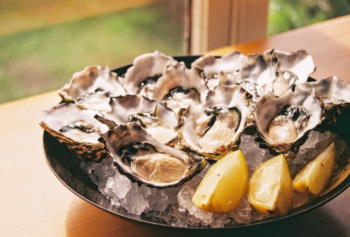Veganism has become an increasingly popular lifestyle choice over the years, with people opting to cut out animal products from their diets and lives for ethical, environmental, and health reasons. However, the question of whether oysters can be considered vegan remains a contentious issue. Oysters are mollusks that are often consumed raw, cooked, or as an ingredient in various dishes. While some people argue that oysters can be part of a vegan diet, others disagree due to their status as living beings. Let’s take a closer look at the debate.
The debate over oyster consumption
One of the main arguments in favor of oysters being vegan is that they are not sentient beings. Sentience refers to the ability to perceive, feel, or experience. Oysters do not have a central nervous system, brain, or pain receptors, which means they do not feel pain or suffer. Therefore, some vegans argue that consuming oysters is not unethical as they are not causing harm or cruelty to a living being.
On the other hand, many vegans believe that oysters cannot be considered vegan as they are still living creatures that are harvested and killed for human consumption. Additionally, oysters are often farmed in a manner that harms other marine life and the environment.
Ethical considerations
One argument against consuming oysters is the ethical consideration of their status as living beings. While oysters do not have a central nervous system and therefore may not feel pain in the same way that animals with a more developed nervous system do, some vegans argue that consuming oysters goes against the principle of not exploiting animals for human consumption. This is a personal choice that each individual must make based on their own values and beliefs.
Environmental impact
Oyster farming can have a significant impact on the environment. The use of natural habitats for oyster farming can lead to the destruction of important ecosystems and the displacement of other marine species. Additionally, the use of chemicals and antibiotics in oyster farming can have negative impacts on water quality and the health of surrounding ecosystems. It is important to consider the environmental impact of oyster farming when making a decision about whether or not to consume oysters.
Nutritional value
While oysters are not a significant source of macronutrients like protein or carbohydrates, they are high in micronutrients like zinc, iron, and vitamin B12. For individuals following a vegan diet, getting enough vitamin B12 can be a challenge, as this nutrient is primarily found in animal-based foods. However, there are many plant-based sources of vitamin B12, such as fortified cereals, plant milks, and nutritional yeast, that can provide adequate amounts of this nutrient without the need to consume animal products like oysters.
Nutritional value of oysters
Regardless of the ethical debate, some people argue that oysters are a healthy and nutritious source of food for vegans. Oysters are low in calories and high in protein, vitamins, minerals, and Omega-3 fatty acids. They are also an excellent source of zinc, which is essential for immune system function, wound healing, and cell growth.
Ethical considerations of consuming oysters
While oysters may not be sentient beings and therefore not feel pain or suffering, many vegans argue that consuming them still goes against the principles of veganism. Veganism is not just about avoiding harm to animals but also about respecting their right to live. Killing oysters for human consumption is seen as exploitative and unnecessary, especially when there are plenty of plant-based alternatives available.
Environmental impact of oyster farming
Another consideration in the oyster debate is the environmental impact of oyster farming. While oyster farming can be sustainable and environmentally friendly, it can also have negative consequences. Oyster farms can disrupt natural ecosystems, and oysters can become invasive species in non-native habitats. Additionally, oyster farming can contribute to water pollution
Alternatives to oysters for vegans
For vegans who choose to avoid oysters, there are plenty of plant-based alternatives available. Seaweed, for example, is a nutrient-rich food that can be used in many dishes and provides a similar umami flavor as oysters. Mushrooms, particularly shiitake mushrooms, are also a popular alternative due to their meaty texture and umami flavor. Another alternative is jackfruit, which has a fibrous texture that makes it a great substitute for seafood in dishes like vegan sushi rolls.
Addressing the issue of sustainability
While some people argue that oysters are a sustainable food source, others point out that overfishing and the degradation of natural habitats can lead to unsustainable practices. One solution to this issue is to promote sustainable oyster farming practices, such as using recycled materials to create oyster beds, reducing energy usage in the farming process, and avoiding the use of harmful chemicals or antibiotics. Additionally, promoting the conservation of natural oyster habitats can help maintain healthy oyster populations and reduce the need for farming.
Conclusion
The debate over whether oysters are vegan is a complex issue that requires careful consideration of ethical, environmental, and nutritional factors. While oysters may not be sentient beings, some vegans believe that consuming them goes against the principles of veganism. Additionally, the environmental impact of oyster farming and the potential for unsustainable practices also needs to be taken into account. For those who choose to avoid oysters, there are plenty of plant-based alternatives available that provide similar nutritional benefits and flavors

